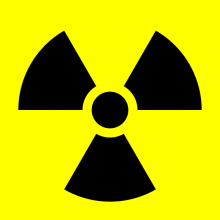For all the concerns about a nuclear weapons-armed Iran and the faulty Iran nuclear deal, there just might be an even greater concern for the world over the consequences of Iran’s nuclear program: a Middle East filled with nuclear weapons-armed countries. “Many countries in the Middle East are saying that they are also allowed to enrich uranium if Iran is allowed to do so,” said Israeli Prime Minister Benjamin Netanyahu on Sunday. “Therefore, the way to prevent this danger, the nuclearization of the Middle East, is to either thoroughly correct the [Iran nuclear] agreement or abrogate it.”
Netanyahu, in comments to the Israeli cabinet published by his office, said that the diplomatic talks with a variety of United States officials last week during a visit to America “focused mainly on Iran.” Said the Israeli leader, “I said that the nuclear agreement with Iran contains within it many dangers for the world, including the special danger of the nuclearization of the Middle East.”
A February report from the Institute for Policy and Strategy at the Interdisciplinary Center Herzliya in Israel noted that multiple nations—including Egypt and Saudi Arabia—are working towards building nuclear power programs. Citing a variety of news articles on the nuclear plans, Shaul Shay wrote in the report that the United Arab Emirates is planning to officially open the first Arab nuclear power plant this year.
Nuclear power doesn’t need to proceed to nuclear weapons, and Shay noted that the UAE nuclear non-proliferation arrangement with the US is especially solid. As a more troubling illustration of where the nuclear programs in the Middle East could go, however, Shay notes that while Egypt signed the Treaty on the Non-Proliferation of Nuclear Weapons (NPT), they have not accepted the part of the treaty that allows spot inspections.
US President Donald Trump has insisted that Europe develop a supplementary agreement to the Iran nuclear deal that would better prevent the Islamic Republic from acquiring nuclear weapons or the missiles to deliver them. He has given a deadline this spring to develop that plan and efforts are already underway.
However, the Iranians are pushing back strongly against amendments to their arrangement with the world powers. Iranian President Hassan Rouhani last week, in comments quoted by the Fars News Agency, said that “everyone will regret the possible collapse of the landmark nuclear agreement.”
The same Fars article also said that Iran refuses to change the nuclear deal and won’t even discuss their missile and defense programs, according to spokesman of the Atomic Energy Organization of Iran (AEOI) Behrouz Kamalvandi.
Meanwhile, a separate Fars article quoted Iranian senior commander Major General Gholam Ali Rashid as claiming that Israel “will avoid testing” Iran “because it cannot manage confrontation against Iran and cannot bear its costs.” He warned of “unimaginable costs” for attacking Iran.
Netanyahu, in his comments on Sunday, acknowledged Iranian threats to Israel and underscored their resolve in response.
Said the Israeli premier, “I remind you that Iran declares, on an almost daily basis—including recently—its intention to wipe out the State of Israel. It is hardly worth saying that we will not allow this, to put it mildly.”
(By Joshua Spurlock, www.themideastupdate.com, March 11, 2018)

